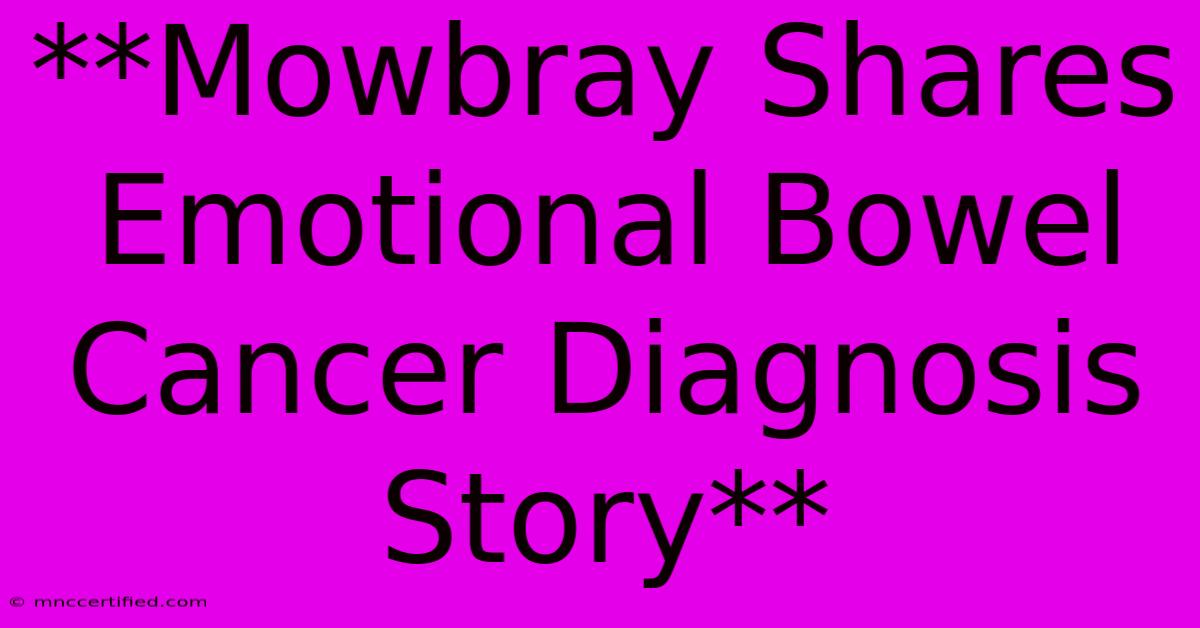**Mowbray Shares Emotional Bowel Cancer Diagnosis Story**

Table of Contents
Mowbray Shares Emotional Bowel Cancer Diagnosis Story: A Call to Action for Early Detection
Former professional rugby player, David Mowbray, has bravely opened up about his recent bowel cancer diagnosis, urging others to be proactive about their health and seek medical attention if they experience any unusual symptoms.
Mowbray, known for his fierce determination on the rugby field, revealed his diagnosis in a heartfelt interview, sharing the emotional journey he's been on since receiving the news. He highlighted the importance of early detection and the crucial role it plays in successful treatment outcomes.
"I never thought something like this would happen to me," Mowbray admitted, his voice laced with both vulnerability and resolve. "But it's a stark reminder that anyone can be affected by cancer, regardless of age or fitness level."
A Call to Action for Early Detection
Mowbray's story serves as a powerful reminder of the significance of being aware of potential symptoms and seeking medical advice promptly. Early detection is crucial for bowel cancer as it significantly improves the chances of successful treatment and recovery.
Common symptoms of bowel cancer include:
- Changes in bowel habits: This can include diarrhea, constipation, or a change in the consistency or frequency of bowel movements.
- Blood in the stool: This can be bright red or dark and tarry.
- Abdominal pain or discomfort: This can be persistent or intermittent.
- Unexplained weight loss: This can occur without any changes in diet or exercise habits.
- Fatigue: This can be persistent and debilitating.
- Anemia: This can be caused by blood loss in the gut.
If you experience any of these symptoms, it's important to see your doctor for a check-up. While these symptoms can be caused by other conditions, early detection and diagnosis of bowel cancer are key to improving treatment outcomes.
Beyond Diagnosis: Finding Strength and Support
Mowbray's story isn't just about the diagnosis, but also about the strength and support he's finding in his journey. He expressed gratitude for his loved ones and the incredible medical team assisting him. He also acknowledged the importance of mental health support during this time.
"It's not easy," Mowbray confessed. "There are days when fear and uncertainty creep in. But I'm determined to fight this. I'm surrounded by incredible support, and I know I can get through this."
Mowbray's message of hope and resilience resonates deeply, inspiring others facing similar challenges. His openness about his experience encourages others to seek support and be proactive in their health.
Taking Action: What You Can Do
Inspired by Mowbray's courage, here are some actionable steps you can take to prioritize your health and potentially prevent bowel cancer:
- Know your family history: A family history of bowel cancer increases your risk. Discuss your family history with your doctor and ask if you should be screened earlier.
- Adopt a healthy lifestyle: Maintain a healthy weight, eat a balanced diet rich in fruits, vegetables, and whole grains, and engage in regular physical activity.
- Get screened: Regular screening can detect bowel cancer early when it is most treatable. Talk to your doctor about the recommended screening guidelines for your age and risk factors.
- Listen to your body: Don't ignore any unusual symptoms. If you experience changes in your bowel habits, blood in your stool, or any other concerning symptoms, see your doctor immediately.
Mowbray's story is a testament to the power of early detection, the importance of support, and the strength of the human spirit. It's a call to action for all of us to prioritize our health and be proactive in our well-being.

Thank you for visiting our website wich cover about **Mowbray Shares Emotional Bowel Cancer Diagnosis Story**. We hope the information provided has been useful to you. Feel free to contact us if you have any questions or need further assistance. See you next time and dont miss to bookmark.
Featured Posts
-
Bucs Vs 49ers Inactives Whitehead Plays
Nov 11, 2024
-
Premier League Ipswich Upsets Tottenham In First Match
Nov 11, 2024
-
Fiji Earns First Win Over Wales
Nov 11, 2024
-
Falcons At Saints Odds Line And Game Time
Nov 11, 2024
-
Mc Caffreys Availability For Week 10 Bucs Game
Nov 11, 2024